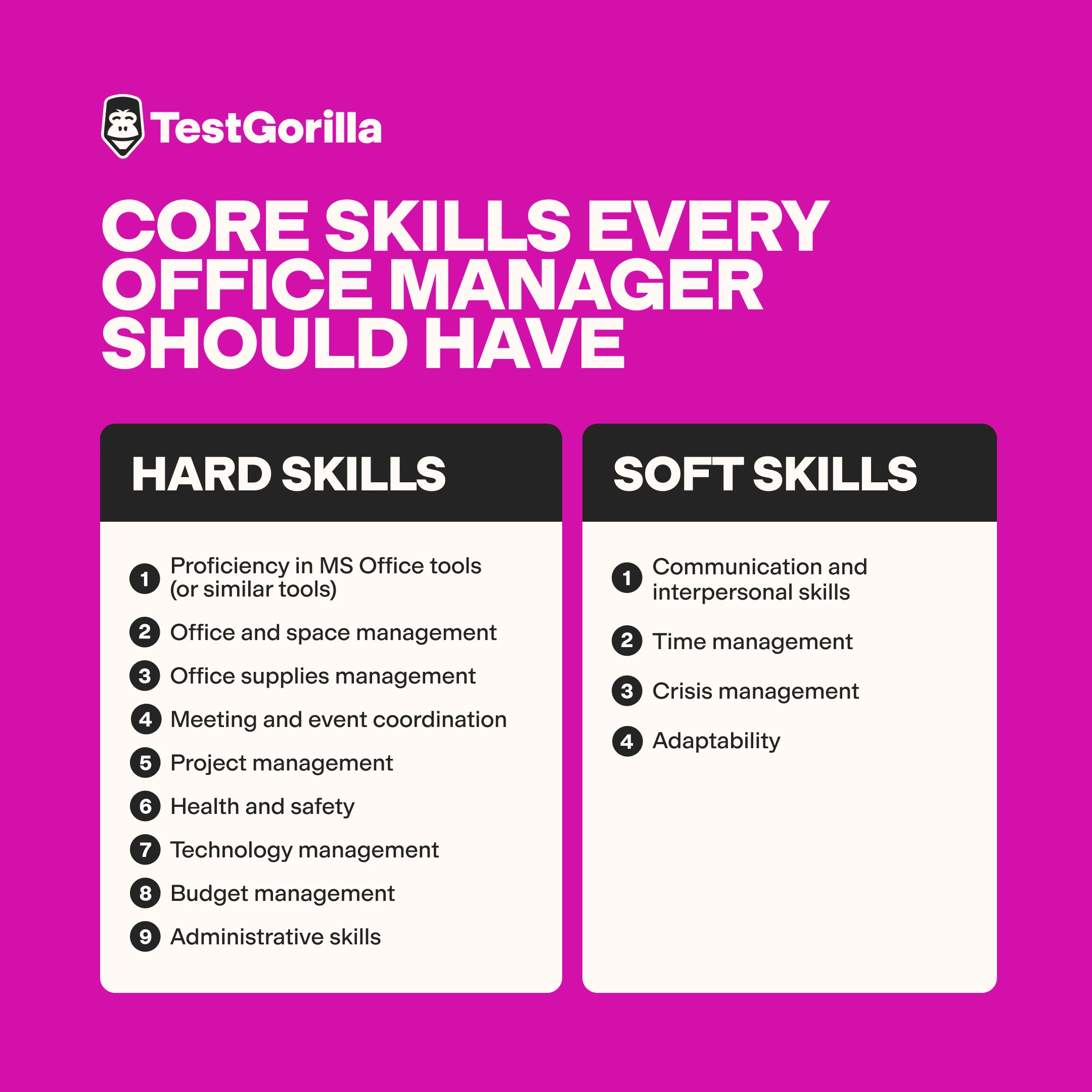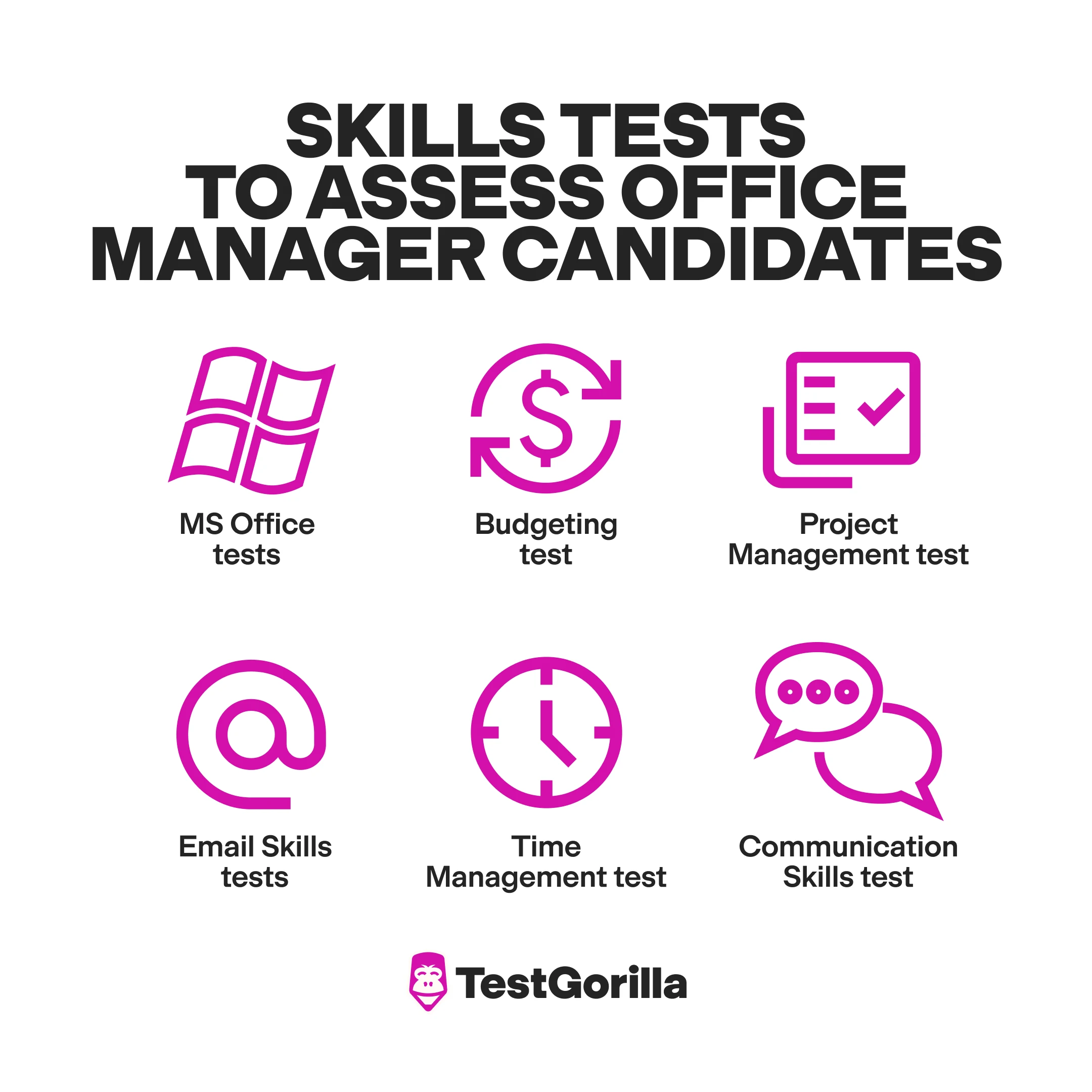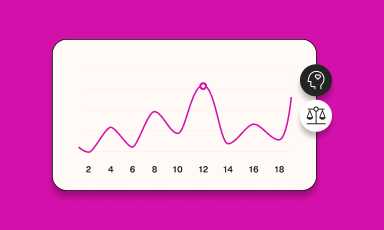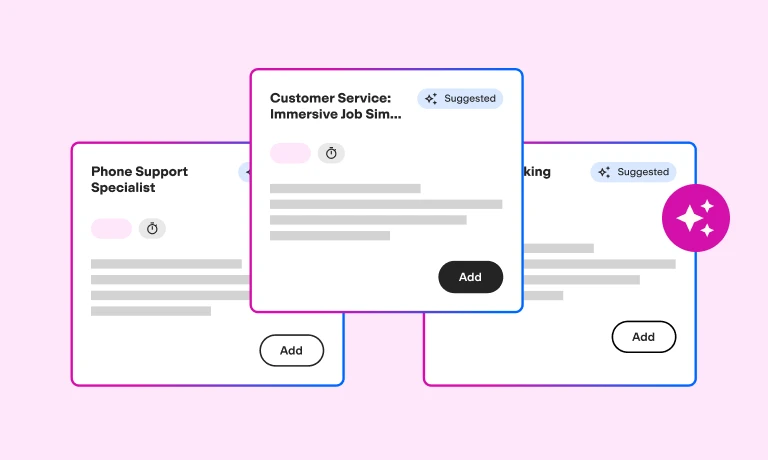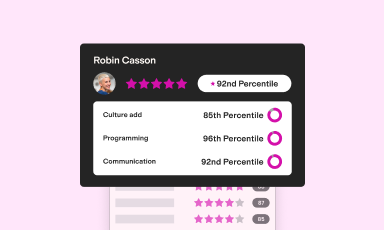So, you've been tasked with hiring an office manager for your team. But where do you start?
Understanding the essential skills for office managers is key to finding someone who will keep the office running like a well-oiled machine. But, without a clear grasp of what skills a candidate needs, you might have no clue where to begin.
In this article, we'll walk you through the skills every office manager needs, giving you the tools to spot the perfect applicant from a mile away. Ready to get started? Let’s begin.
What is an office manager?
An office manager is responsible for overseeing office administrative tasks and making sure your office – and everyone in it – has everything they need to run smoothly.
They're the go-to person for pretty much everything office-related. From managing bookings for conference rooms to ordering office supplies, they're the heartbeat of the office.
Office managers work closely with employees at all levels – from the CEO to interns – making sure everyone has what they need to thrive. They're often the first point of contact for anyone external like clients and vendors.
The confusing thing about office managers? They’re rarely direct line managers. They usually operate behind the scenes, ensuring the smooth running of the day-to-day without getting involved in technical management tasks. They connect different parts of the office, helping people communicate and work together better. Even though they might not be people managers, they're essential for keeping the office ticking along smoothly.
Core skills most office managers need
Office managers need a unique set of skills to tackle this role effectively. The exact skills each individual office manager needs will depend on the role and the office – their duties can vary a lot.
Here are some hard and soft skills most office managers need to excel in their role.
Hard skills
Proficiency in MS Office tools (or similar tools).Office managers rely heavily on software like Microsoft Word, Excel, PowerPoint, and Access. They’re also likely to use Outlook and Google Workspaces pretty regularly.
Office and space management. Office managers make sure everything runs smoothly in the office space. They take care of things like ordering and repairing furniture, dealing with minor maintenance issues, working with vendors and service providers, and making sure the office space is used effectively.
Office supplies management. Office managers keep track of office supplies and inventory. They make sure there's enough of everything, order supplies when needed, and negotiate with vendors to get the best deals. They make sure the team always has what they need to get their work done.
Meeting and event coordination. Office managers often plan meetings and events, both inside and outside the office. They handle everything from picking a location to organizing all the details and keeping track of who's coming.
Project management. Office managers are often in charge of different projects, like office renovations. They need to be good at planning, organizing, and making sure everything gets done on time.
Health and safety.Keeping everyone safe at work is a big part of an office manager's job. They make sure safety rules are followed, do regular checks to spot any hazards, and make sure the office meets all the safety rules and laws.
Technology management. Office managers should know their way around the tech stuff in the office. They don’t need to be IT experts, but they often help out when computers act up, keep an eye on office gadgets like printers, and sometimes help set up new software or updates.
Budget management.Office managers need to keep an eye on the money stuff. They track spending, crunch numbers for financial reports, and make sure that what the company is spending stays within the office budget. They budget for events, office projects, and more.
Administrative skills. Office managers often handle admin tasks, too – like paying office bills, dealing with overbooked conference rooms, and answering calls and emails.
Soft skills
Communication and interpersonal skills. Office managers are experts in communication and building relationships. They need to be good at building connections, solving problems without causing drama, and making sure everyone gets the right information.
Time management. Office managers have a lot on their plate. They need to be good at managing time, prioritizing tasks, using resources wisely, and meeting deadlines without letting things slip through the cracks.
Crisis management. Sometimes things go wrong in the office, like technology breaking or emergencies happening. When that happens, office managers need to stay cool under pressure and figure out how to fix things fast.
Adaptability. Office environments can change fast, with new challenges popping up all the time. Office managers need to be able to roll with the punches, adjusting their plans and strategies to keep things on track and make sure everyone stays productive.
The best insights on HR and recruitment, delivered to your inbox.
Biweekly updates. No spam. Unsubscribe any time.
How to assess office manager candidates
Office managers are usually friendly and personable. But it’s important to make sure they have the needed skills no matter how charming they are. After attracting candidates with a strong office manager job description template, our multi-measure talent assessments can help find candidates with the right skills.
TestGorilla is a talent discovery platform. We have 350+ in our test library, meaning you can test a range of skills and competencies to find your next great office manager. Plus, our tests are fully customizable, and you can combine up to five tests to create a unique talent assessment.
Let’s see what this might look like.
Assessing hard skills
Think about using the following tests to measure an office manager candidate’s hard skills.
MS Office tests.TestGorilla offers talent assessments in Word, Excel, Powerpoint, Access, and Outlook to help you measure an applicant’s skills in these tools. It’s best to focus on testing a candidate’s skills in the software they’ll use day to day. This will help you measure how quickly they’ll adapt to the role and what extra training they may need. (Check out our Google Workspace tests, too.)
Budgeting test. This test can help you see how well candidates will handle the office budget.
Project Management test. This test sees if candidates can plan, organize, and carry out projects successfully while making sure they’re completed on time and within budget.
Email skills tests. Our Outlook or Gmail email skills tests will help you see how well your candidates understand email etiquette and more.
Assessing soft skills
Once you’ve assessed hard skills, it’s time to move on to soft skills.
Time Management test. This test measures a candidate's ability to prioritize tasks, spread out resources efficiently, and meet deadlines without giving up quality or attention to detail.
Communication Skills test. This test measures a candidate's ability to communicate verbally and non-verbally. It measures how well they pick up on body language, how clear they are when they share their ideas, and how well they can listen to and understand others.
Looking at culture add
Culture add isn’t about how well a candidate fits into your current team. It’s about the unique qualities and perspectives they bring to the mix.
A great office manager should not only complement your current office vibe – they should bring something fresh and valuable to the table. Whether it's through their creativity, problem-solving skills, or ability to uplift and motivate others, an office manager should enrich your team by helping them thrive in new ways.
Test whether your candidate will be a good culture add using our Culture Add test. This test clues you in to candidates’ values and behaviors so you can spot the ones who’ll be great additions to the office.
Going deeper with interviews
Couldn’t test your office managers on every skill using our tests? Use interviews to dig deeper into their skills and knowledge.
Behavioral interview questions will help you understand how candidates have behaved in previous job roles, what they learned from their actions, and how they can use what they’ve learned while on the job.
For example, to learn more about their technology management and crisis management skills, you might ask:
“Can you describe a time when you had to troubleshoot a significant IT issue in the office? How did you approach it and what was the outcome?"
To learn more about their project management and office space management skills and adaptability, you might ask:
“Tell me about a time when an office renovation project didn’t go as planned. What happened, what did you do to fix it, and what was the outcome?”
Looking for more suggestions? Check out this list of 36 office manager interview questions to inspire your interview process.
2 mistakes to avoid when assessing candidates
Watch out for these common mistakes when hiring for office manager roles.
1. Not checking for space and supply management know-how
Don’t forget to check if they’re good at managing the physical stuff around the office. Unlike other managers who mainly focus on people or projects, office managers need to keep the office running smoothly. This includes making sure the office is laid out properly, everything is in its place, and things like printer paper or coffee never run out.
If a candidate is great at managing people but doesn’t know how to handle the nitty-gritty of office supplies or how to best use the space, they might struggle to keep the office environment organized and functioning well. It’s important to look for someone who has a knack for this part of the job to avoid daily hiccups that can throw everyone off.
2. Not taking health and safety seriously
Finally, remember that your office manager needs to take the health and safety of the office seriously. The founder of The Office Management Group, Hana Gray, who has over 20 years of office management experience, has said, “It still sometimes surprises me when I learn what [office managers] don’t know about their role, duties or responsibilities, especially when, for example health and safety is concerned.”
If you don’t see how well candidates can handle in-office health and safety matters, you might hire someone who's great at managing office supplies but doesn’t know the first thing about keeping the workplace safe.
So, ask candidates about their experience with health and safety during the assessment process. Find out what they know about regular safety checks or handling any emergency situations, for example.
FAQs
Check out these frequently asked questions.
What is the biggest strength of an office manager?
The biggest strength of an office manager is their ability to juggle multiple tasks and responsibilities while keeping everything running smoothly. Their ability to multitask, prioritize effectively, and keep a smile on their face is second to none.
What’s the difference between an office manager and facility manager?
An office manager takes care of day-to-day stuff like making sure everyone has the supplies they need, handling mail, and keeping internal systems running smoothly. On the other hand, a facility manager deals with the bigger picture – like maintaining the building, making sure the facility meets safety standards, and handling big repairs or upgrades.
Find your next office manager with TestGorilla
Looking for a great office manager in a sea of candidates can feel like finding a needle in a haystack. How do you find those who genuinely have the skills to do the job?
That's where TestGorilla comes in. We're here to help you cut through the noise and pinpoint the perfect office manager for your team. With our tests, you can assess candidates on a wide range of skills and competencies – from MS Office proficiency to communication abilities. You can do this before you look at their resumes so you can find the most skilled candidates right away.
No more second-guessing whether a candidate is the real deal or just a smooth talker. With TestGorilla, you'll get deep insights into each candidate's strengths and areas for development – so you can make confident, data-driven hiring decisions.
To learn more about how we can help you find that perfect office manager, sign up for a free account or watch a live demo today!
You've scrolled this far
Why not try TestGorilla for free, and see what happens when you put skills first.


